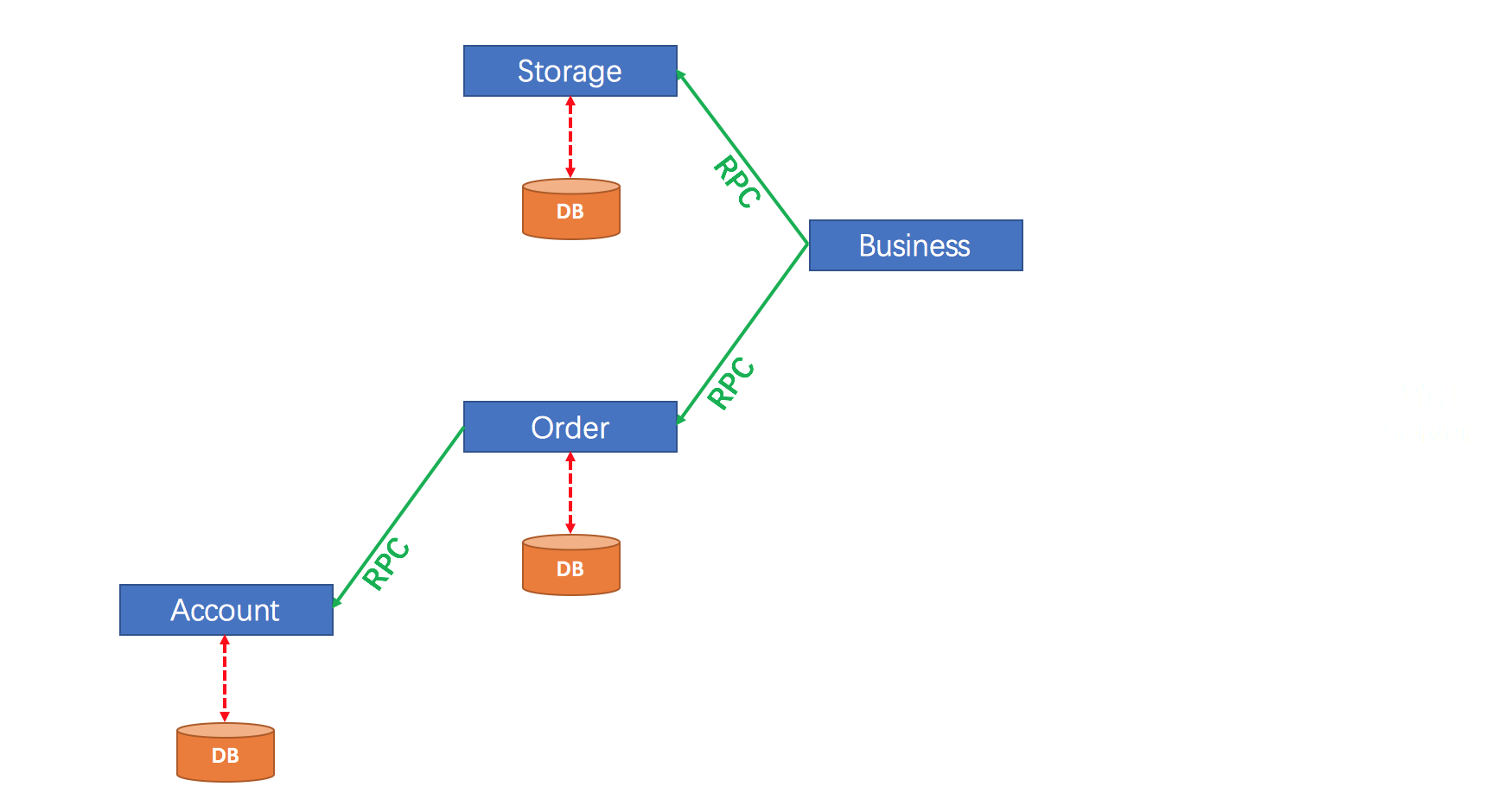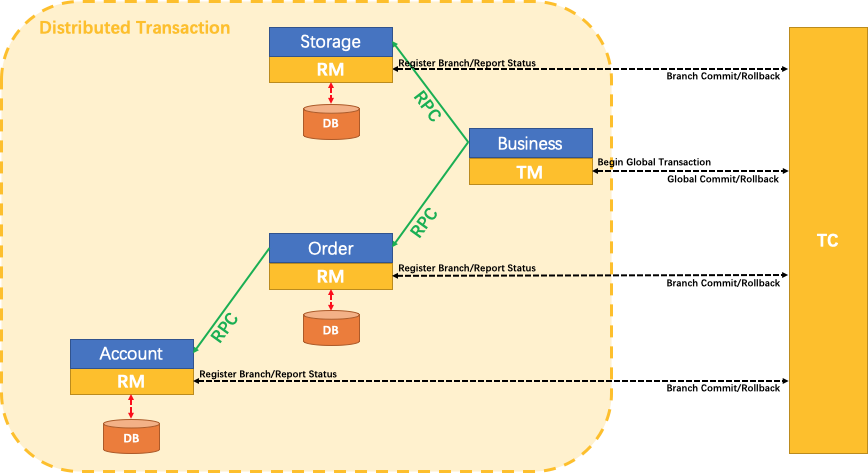-
Notifications
You must be signed in to change notification settings - Fork 8.8k
Quick Start
xingfudeshi edited this page Jun 3, 2019
·
19 revisions
Let's begin with a Microservices example.
A business logic for user purchasing commodities. The whole business logic is powered by 3 microservices:
- Storage service: deduct storage count on given commodity.
- Order service: create order according to purchase request.
- Account service: debit the balance of user's account.
public interface StorageService {
/**
* deduct storage count
*/
void deduct(String commodityCode, int count);
}public interface OrderService {
/**
* create order
*/
Order create(String userId, String commodityCode, int orderCount);
}public interface AccountService {
/**
* debit balance of user's account
*/
void debit(String userId, int money);
}public class BusinessServiceImpl implements BusinessService {
private StorageService storageService;
private OrderService orderService;
/**
* purchase
*/
public void purchase(String userId, String commodityCode, int orderCount) {
storageService.deduct(commodityCode, orderCount);
orderService.create(userId, commodityCode, orderCount);
}
}public class OrderServiceImpl implements OrderService {
private OrderDAO orderDAO;
private AccountService accountService;
public Order create(String userId, String commodityCode, int orderCount) {
int orderMoney = calculate(commodityCode, orderCount);
accountService.debit(userId, orderMoney);
Order order = new Order();
order.userId = userId;
order.commodityCode = commodityCode;
order.count = orderCount;
order.money = orderMoney;
// INSERT INTO orders ...
return orderDAO.insert(order);
}We just need an annotation @GlobalTransactional on business method:
@GlobalTransactional
public void purchase(String userId, String commodityCode, int orderCount) {
......
}- Requirement: MySQL with InnoDB engine.
Note: In fact, there should be 3 database for the 3 services in the example use case. However, we can just create one database and configure 3 data sources for simple.
Modify Spring XML with the database URL/username/password you just created.
dubbo-account-service.xml dubbo-order-service.xml dubbo-storage-service.xml
<property name="url" value="jdbc:mysql://x.x.x.x:3306/xxx" />
<property name="username" value="xxx" />
<property name="password" value="xxx" />UNDO_LOG table is required by SEATA AT mode.
-- 注意此处0.3.0+ 增加唯一索引 ux_undo_log
CREATE TABLE `undo_log` (
`id` bigint(20) NOT NULL AUTO_INCREMENT,
`branch_id` bigint(20) NOT NULL,
`xid` varchar(100) NOT NULL,
`rollback_info` longblob NOT NULL,
`log_status` int(11) NOT NULL,
`log_created` datetime NOT NULL,
`log_modified` datetime NOT NULL,
`ext` varchar(100) DEFAULT NULL,
PRIMARY KEY (`id`),
UNIQUE KEY `ux_undo_log` (`xid`,`branch_id`)
) ENGINE=InnoDB AUTO_INCREMENT=1 DEFAULT CHARSET=utf8;DROP TABLE IF EXISTS `storage_tbl`;
CREATE TABLE `storage_tbl` (
`id` int(11) NOT NULL AUTO_INCREMENT,
`commodity_code` varchar(255) DEFAULT NULL,
`count` int(11) DEFAULT 0,
PRIMARY KEY (`id`),
UNIQUE KEY (`commodity_code`)
) ENGINE=InnoDB DEFAULT CHARSET=utf8;
DROP TABLE IF EXISTS `order_tbl`;
CREATE TABLE `order_tbl` (
`id` int(11) NOT NULL AUTO_INCREMENT,
`user_id` varchar(255) DEFAULT NULL,
`commodity_code` varchar(255) DEFAULT NULL,
`count` int(11) DEFAULT 0,
`money` int(11) DEFAULT 0,
PRIMARY KEY (`id`)
) ENGINE=InnoDB DEFAULT CHARSET=utf8;
DROP TABLE IF EXISTS `account_tbl`;
CREATE TABLE `account_tbl` (
`id` int(11) NOT NULL AUTO_INCREMENT,
`user_id` varchar(255) DEFAULT NULL,
`money` int(11) DEFAULT 0,
PRIMARY KEY (`id`)
) ENGINE=InnoDB DEFAULT CHARSET=utf8;- Download server package from https://github.com/seata/seata/releases, unzip it.
Usage: sh seata-server.sh(for linux and mac) or cmd seata-server.bat(for windows) [options]
Options:
--host, -h
The host to bind.
Default: 0.0.0.0
--port, -p
The port to listen.
Default: 8091
--storeMode, -m
log store mode : file、db
Default: file
--help
e.g.
sh seata-server.sh -p 8091 -h 127.0.0.1 -m fileGo to samples repo: seata-samples
- Start DubboAccountServiceStarter
- Start DubboStorageServiceStarter
- Start DubboOrderServiceStarter
- Run DubboBusinessTester for demo test
TBD: scripts for run demo applications

